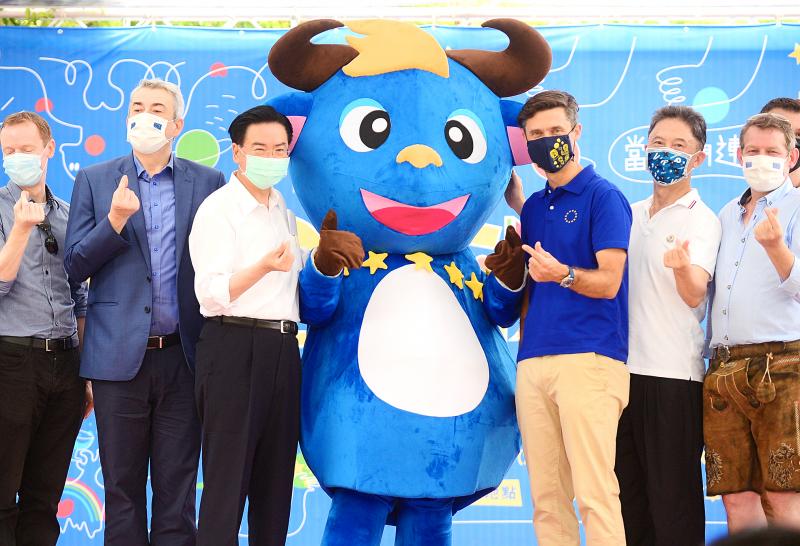This year’s Europe Festival opened yesterday in Taipei to celebrate Europe Day and give people a taste of the continent while international travel is hampered by the COVID-19 pandemic.
The two-day fair, themed “The EU Connects,” organized by the European Economic and Trade Office in Taiwan, is held on a swathe of grass on the northern side of the Huashan 1914 Creative Park in Taipei.
This year’s edition features more than 50 stalls that showcase European brands, products, food, cuisine and cultural activities.

Photo: Wang Yi-sung, Taipei Times
The festival was not held in the previous two years.
Office Director Filip Grzegorzewski, representatives of 15 EU member states in Taiwan, Minister of Foreign Affairs Joseph Wu (吳釗燮) and Taipei Commissioner for External Affairs Tom Chou (周台竹) were among the attendees at the festival’s opening.
“I believe this pandemic has shown us how deeply connected we are with each other,” Grzegorzewski said.
“The EU and Taiwan may seem far from each other geographically, but we are connected through the common values we share as like-minded partners, such as democracy, human rights and the rule of law,” he said.
Wu said that Taiwan-EU relations have “never been stronger.”
He thanked European countries for voicing support for Taiwan’s wish to participate in international organizations, citing the French Senate’s adoption of a resolution to that effect and a joint communique on the issue from G7 foreign ministers.
Europe Day marks the EU’s birthday, according to the office’s Web site.
On May 9, 1950, then-French minister of foreign affairs Robert Schuman “proposed a European peace project to end all wars on the European continent. The plan then gave birth to the European Union as we know it today,” a statement on the Web site said, adding that May 9 “is thus commemorated as ‘Europe Day,’ and a day to highlight Europe’s unity and diversity.”

A preclearance service to facilitate entry for people traveling to select airports in Japan would be available from Thursday next week to Feb. 25 at Taiwan Taoyuan International Airport, Taoyuan International Airport Corp (TIAC) said on Tuesday. The service was first made available to Taiwanese travelers throughout the winter vacation of 2024 and during the Lunar New Year holiday. In addition to flights to the Japanese cities of Hakodate, Asahikawa, Akita, Sendai, Niigata, Okayama, Takamatsu, Kumamoto and Kagoshima, the service would be available to travelers to Kobe and Oita. The service can be accessed by passengers of 15 flight routes operated by

MORE FALL: An investigation into one of Xi’s key cronies, part of a broader ‘anti-corruption’ drive, indicates that he might have a deep distrust in the military, an expert said China’s latest military purge underscores systemic risks in its shift from collective leadership to sole rule under Chinese President Xi Jinping (習近平), and could disrupt its chain of command and military capabilities, a national security official said yesterday. If decisionmaking within the Chinese Communist Party has become “irrational” under one-man rule, the Taiwan Strait and the regional situation must be approached with extreme caution, given unforeseen risks, they added. The anonymous official made the remarks as China’s Central Military Commission Vice Chairman Zhang Youxia (張又俠) and Joint Staff Department Chief of Staff Liu Zhenli (劉振立) were reportedly being investigated for suspected “serious

ENHANCING EFFICIENCY: The apron can accommodate 16 airplanes overnight at Taoyuan airport while work on the third runway continues, the transport minister said A new temporary overnight parking apron at Taiwan Taoyuan International Airport is to start operating on Friday next week to boost operational efficiency while the third runway is being constructed, the Ministry of Transportation and Communications said yesterday. The apron — one of the crucial projects in the construction of the third runway — can accommodate 16 aircraft overnight at the nation’s largest international airport, Minister of Transportation and Communications Chen Shih-kai (陳世凱) told reporters while inspecting the new facility yesterday morning. Aside from providing the airport operator with greater flexibility in aircraft parking during the third runway construction,

American climber Alex Honnold is to attempt a free climb of Taipei 101 today at 9am, with traffic closures around the skyscraper. To accommodate the climb attempt and filming, the Taipei Department of Transportation said traffic controls would be enforced around the Taipei 101 area. If weather conditions delay the climb, the restrictions would be pushed back to tomorrow. Traffic controls would be in place today from 7am to 11am around the Taipei 101 area, the department said. Songzhi Road would be fully closed in both directions between Songlian Road and Xinyi Road Sec 5, it said, adding that bidirectional traffic controls would